
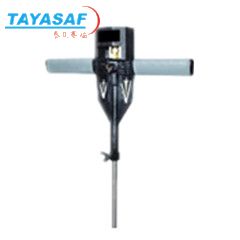

Soil Compaction Tester土壤密实度仪
| 订货号: | MM-84693-00 |
| 产地: | 芬兰 |
| 品牌: | |
| 开发编号: | Y |
| 市场价: | ¥ |
| *此产品根据配置不同价格不同 |
| *此价格为参考价格,具体价格以订单合同为准 |
- 我在现场:
- 产品视频:

- 产品描述
- 技术参数
- 技术文档
- 相关产品
- 明细价格
- 购买流程
产品描述:

土壤压紧测试仪可以帮助您了解土层是否紧实以及土层的深度。仪器有两个尖端:一个直径1.27cm,另一个1.91cm。

Soil compaction can occur in any type of soil. Years of traffic and tillage can cause soil particles to group together and fill in air spaces in the soil creating a “plow pan” below the tillage area. When this happens, a hard layer is formed making it difficult for moisture and roots to pen-etrate the soil.
Some soil types are more susceptible to compaction than others; but once a compaction layer is formed, and moisture and traffic continues, the compaction layer will continue to get denser and thicker.
|
TYPICAL COMPACTION |
|
|
| |
|
SITUATION |
|
|
|
|
|
Disc Depth |
|
|
8 cm |
|
|
Abnormal Root |
|
|
45 kg | |
|
|
|
| ||
|
|
Development |
|
23 cm |
Uncompacted |
|
|
|
|
| |
|
Plough Depth |
|
|
|
|
|
Plough Pan |
Roots Cannot |
Moisture is |
38 cm |
180 kg |
|
Trapped Above |
| |||
|
|
Penetrate |
|
Compacted | |
|
|
and Below |
| ||
|
|
|
|
| |
|
Subsoiling Depth |
|
|
|
34 kg |
|
|
|
|
| |
|
|
|
|
|
Uncompacted |
WHAT ARE THE IMPACTS OF A SOIL COMPACTION PROBLEM?
1. Compacted soil is much harder to work. This will cause you to use more power and take longer to till, wasting fuel, time and money.
2. You may already be aware of soil compaction but not have the tools to determine if it is a problem. For example, unnecessarily trying to correct soil compaction by tilling to a deeper depth can be a waste of time and money.
3. Your crop yield can be reduced by as much as 50% because of poor root and plant development.
4. Compacted soil can prevent water from penetrating deeper into the soil. This can reduce plant development and yield especially during dry periods with no rain. Compaction can also lead to surface water retention making the field more difficult to work in the spring and fall seasons.
5. In compacted soil, fertilizers, pesticides and herbicides can more eas-ily be washed away and not absorbed or even become more concen-trated causing plant damage. This can result in reduced crop yield.
WHAT TO DO ABOUT A SOIL COMPACTION PROBLEM?
If you have determined that you have a soil compaction problem and at what depth the compaction exists, your solution could be as easy as one of the following:
• Reducing traffic in the affected areas of the field.
• Seeding cover crops that will improve water management.
• Choosing a tillage tool that will penetrate the compacted area of the field.
Your local agricultural extension office is a good source of information to help you determine what can be done to help correct and prevent soil compaction problems.
WHAT IS A SOIL COMPACTION TESTER?
Your Soil Compaction Tester is a penetrometer which measures the com-paction of soil and is based on the ASAE S313.3 standard. The tester is supplied with two tips: a small tip (1/2” diameter) for use in firm soil and a large tip (3/4”diameter) for use in soft soil. The dial has two scales (one for each tip) that are calibrated in pounds per square inch of the base area of the cone shaped tip.
THE DIAL IS COLOR-CODED FOR REFERENCE:
Green (0 - 200 psi) / 0-14 kg/cm2
Good Growing Conditions
Yellow (200 - 300 psi) / 14-21 kg/cm2
Fair Growing Conditions
Red (300 psi and above) / 21 kg/cm2 and above
Poor Growing Conditions
技术参数:

泰亚赛福作为众多知名品牌的合作伙伴,优惠的价格+完善的售后服务体系向您提供产品。font>

泰亚赛福作为众多知名品牌的合作伙伴,优惠的价格+完善的售后服务体系向您提供产品。font>
技术文档:

泰亚赛福作为众多知名品牌的合作伙伴,优惠的价格+完善的售后服务体系向您提供产品。font>
- 在线浏览:
- 文档下载:

泰亚赛福作为众多知名品牌的合作伙伴,优惠的价格+完善的售后服务体系向您提供产品。font>
相关产品:

泰亚赛福作为众多知名品牌的合作伙伴,优惠的价格+完善的售后服务体系向您提供产品。font>
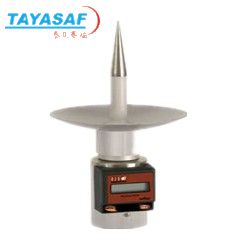 Wile Bio Moisture木屑水分仪订货号:MM-84695-00
Wile Bio Moisture木屑水分仪订货号:MM-84695-00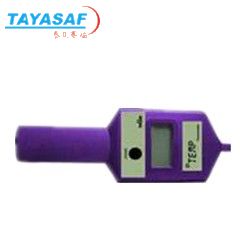 Wile测温仪订货号:MM-84683-00
Wile测温仪订货号:MM-84683-00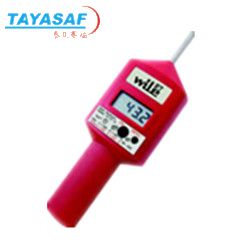 wile27手持式饲草饲料水分仪订货号:MM-84686-00
wile27手持式饲草饲料水分仪订货号:MM-84686-00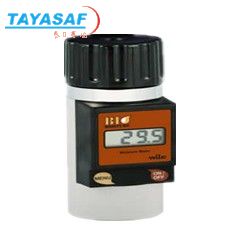 WILE Bio Moisture Wood木材水分仪订货号:MM-84696-00
WILE Bio Moisture Wood木材水分仪订货号:MM-84696-00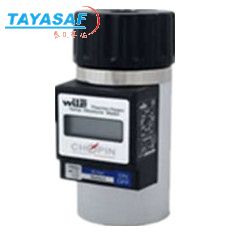 Wile65手持式水分测定仪订货号:MM-61612-00
Wile65手持式水分测定仪订货号:MM-61612-00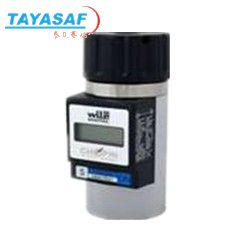 Wile55水分测定仪订货号:MM-61617-00
Wile55水分测定仪订货号:MM-61617-00 Wile35水份测定仪订货号:MM-61618-00
Wile35水份测定仪订货号:MM-61618-00 Wile25手持饲草、烟草水分测定仪订货号:MM-61619-00
Wile25手持饲草、烟草水分测定仪订货号:MM-61619-00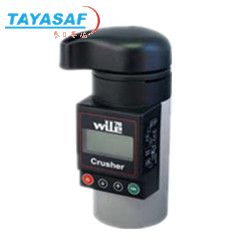 Wile78 碾压式水分仪订货号:MM-84684-00
Wile78 碾压式水分仪订货号:MM-84684-00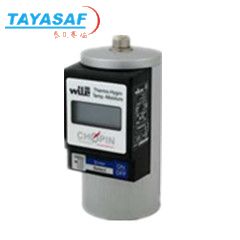 Wile26手持式谷物水分仪订货号:MM-84685-00
Wile26手持式谷物水分仪订货号:MM-84685-00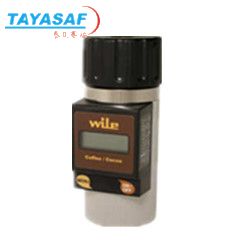 Wile Coffee咖啡水分仪订货号:MM-84692-00
Wile Coffee咖啡水分仪订货号:MM-84692-00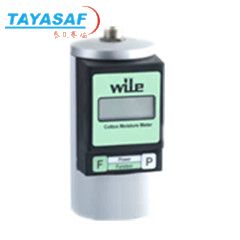 Wile Cotton 棉花水分仪订货号:MM-84694-00
Wile Cotton 棉花水分仪订货号:MM-84694-00

泰亚赛福作为众多知名品牌的合作伙伴,优惠的价格+完善的售后服务体系向您提供产品。font>
明细价格:

泰亚赛福作为众多知名品牌的合作伙伴,优惠的价格+完善的售后服务体系向您提供产品。font>
| 定货号 | 产品名称 | 规格配置 / 简介 | 市场价/(会员价) |
|---|---|---|---|
| MM-84693-00 | Soil Compaction Tester土壤密实度仪 | /() |

泰亚赛福作为众多知名品牌的合作伙伴,优惠的价格+完善的售后服务体系向您提供产品。font>
购买流程:

泰亚赛福作为众多知名品牌的合作伙伴,优惠的价格+完善的售后服务体系向您提供产品。font>
①购买产品:点击“生成订单”→填写产品数量、联系方式并提交→会员顾问订单处理→合同签订。
②咨询产品:请联系会员顾问或致电会员客服电话。
③如果您还不是我们的会员,请先注册。
④最小起订数量:1
注意:本产品唯一个人现金委托收款人,如汇入其它个人账户本公司不承担任何责任
维护担当: 845
上线时间:
投诉电话:13801126385 13911302309
②咨询产品:请联系会员顾问或致电会员客服电话。
③如果您还不是我们的会员,请先注册。
④最小起订数量:1
注意:本产品唯一个人现金委托收款人,如汇入其它个人账户本公司不承担任何责任
维护担当: 845
上线时间:
投诉电话:13801126385 13911302309
联系方式
电话北京:400-000-1836 分机845 或拨0转总机
上海:021-54248686 分机 或拨0转总机
上海:021-54248686 分机 或拨0转总机
传真北京:010-84852750/84854139
上海:021-64418200
上海:021-64418200

泰亚赛福作为众多知名品牌的合作伙伴,优惠的价格+完善的售后服务体系向您提供产品。font>
品牌简介
芬兰芬牧农牧电子仪器公司(Farmcomp agroelectronics)拥有65年的历史,其粮食和饲草水分检测仪器和电围栏设备在欧洲乃致全世界都有很好的声誉,畅销世界各地。其主要仪器有…芬兰芬牧农牧电子仪器公司(Farmcomp agroelectronics)拥有65年的历史,其粮食和饲草水分检测仪器和电围栏设备在欧洲乃致全世界都有很好的声誉,畅销世界各地。其主要仪器有:Wile55手持粮食水分测定仪 、Wile65汉显手持粮食水分测定仪、Wile35手持指针式粮食水分测定仪、Wile25手持饲草水份测定仪、粮食容重测量器、交流电源、蓄电池及太阳能供电等十多个型号的OLLI型电围栏电脉冲发生器及附属设备。产品进入中国市场多年来,深得用户的好评。
您最近浏览的商品










 芬兰芬牧
芬兰芬牧



